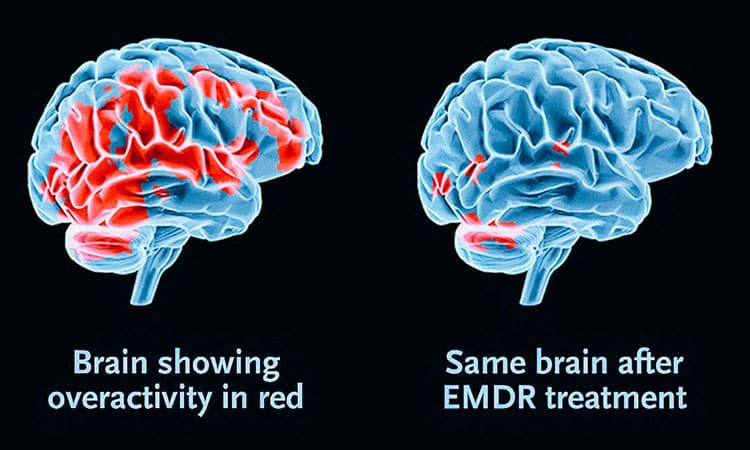Understanding EMDR Effectiveness
EMDR (Eye Movement Desensitization and Reprocessing) is a structured, evidence-based psychotherapy used to treat trauma. By using bilateral stimulation, such as eye movements or tactile cues, EMDR supports the brain’s ability to reprocess distressing experiences. Over time, this reduces the emotional charge of traumatic memories and improves daily functioning.
Addressing the Skepticism
If you’re a high-functioning professional, you likely approach personal development the same way you approach your work with intention, evidence, and results in mind. That’s why skepticism about trauma therapy is natural. You may ask, “Will EMDR actually work for me?” When anxiety interrupts your performance or panic spikes in high-stakes moments, EMDR may offer a targeted, efficient path forward.
How EMDR Works
During an EMDR session, the therapist helps you access a distressing memory while guiding you through bilateral stimulation. This process activates both hemispheres of the brain, allowing fragmented experiences to be reorganized and resolved. Think of it as updating outdated software. Your system keeps the memory but removes its disruptive programming. This process happens without the need for detailed verbal retelling, which many professionals find emotionally taxing or counterproductive.
Who Can Benefit from EMDR Therapy
EMDR is widely used to treat PTSD, panic disorder, phobias, and anxiety rooted in trauma. For professionals, symptoms might manifest as hypervigilance in high-pressure settings, avoidance of certain responsibilities, or chronic fatigue that doesn’t match your workload. While the EMDR therapy benefits are well-documented, this approach may not be suitable during active manic episodes or in cases of severe dissociation. Qualified therapists conduct thorough assessments before beginning treatment.
Scientific Evidence Supporting EMDR Treatment Outcomes
The EMDR treatment outcomes are backed by more than 30 randomized controlled trials. The World Health Organization endorses EMDR as a first-line treatment for PTSD. Brain imaging studies show that EMDR reduces overactivity in the amygdala (the fear center) and strengthens the regulatory function of the prefrontal cortex. Compared to cognitive behavioral therapy, EMDR often leads to faster reductions in somatic symptoms like heart palpitations, tension, and sleep disturbances. For many, this means relief without the cognitive overload of traditional homework-based therapy.
What to Expect in Treatment
EMDR typically involves 8 to 12 sessions. Early appointments focus on history-taking, identifying target memories, and building emotional regulation strategies. As therapy progresses, your clinician will guide you through reprocessing memories using bilateral stimulation. Most clients experience temporary emotional fatigue following sessions, which is part of the brain’s adaptive process. Your therapist will teach stabilization tools to help you stay grounded between visits.
Best Practices for Getting Started
Choose a certified EMDR clinician through a trusted directory such as EMDRIA. Be prepared to commit to several sessions before evaluating results. It often takes a few weeks for benefits to build. Between sessions, consider light somatic practices like gentle breathwork to support nervous system regulation. It is also wise to keep your schedule light after appointments, as emotional integration may take time.
Clarifying Common Myths
Myth: EMDR is a form of hypnosis.
Fact: You remain alert, engaged, and in control throughout the process.
Myth: EMDR only helps military trauma.
Fact: EMDR is highly effective for everyday professionals experiencing trauma from car accidents, medical emergencies, workplace stress, or childhood adversity.
FAQ
Q: How fast does EMDR work for anxiety?
A: Some clients report reduced physiological symptoms, like a calmer heart rate or fewer intrusive thoughts within three sessions. More complex cases may require longer treatment.
Q: Can EMDR address panic without PTSD?
A: Yes. EMDR helps reprocess triggers that reinforce panic cycles, even when PTSD is not formally diagnosed.
Q: Does EMDR work without medication?
A: Many find it effective on its own. EMDR targets the neurological origins of trauma, though some clients choose to combine it with medication for broader symptom management.
Take the Next Step
If you’re ready to explore trauma therapy that meets the pace and precision of your professional life, consider connecting with an EMDR-certified therapist.






